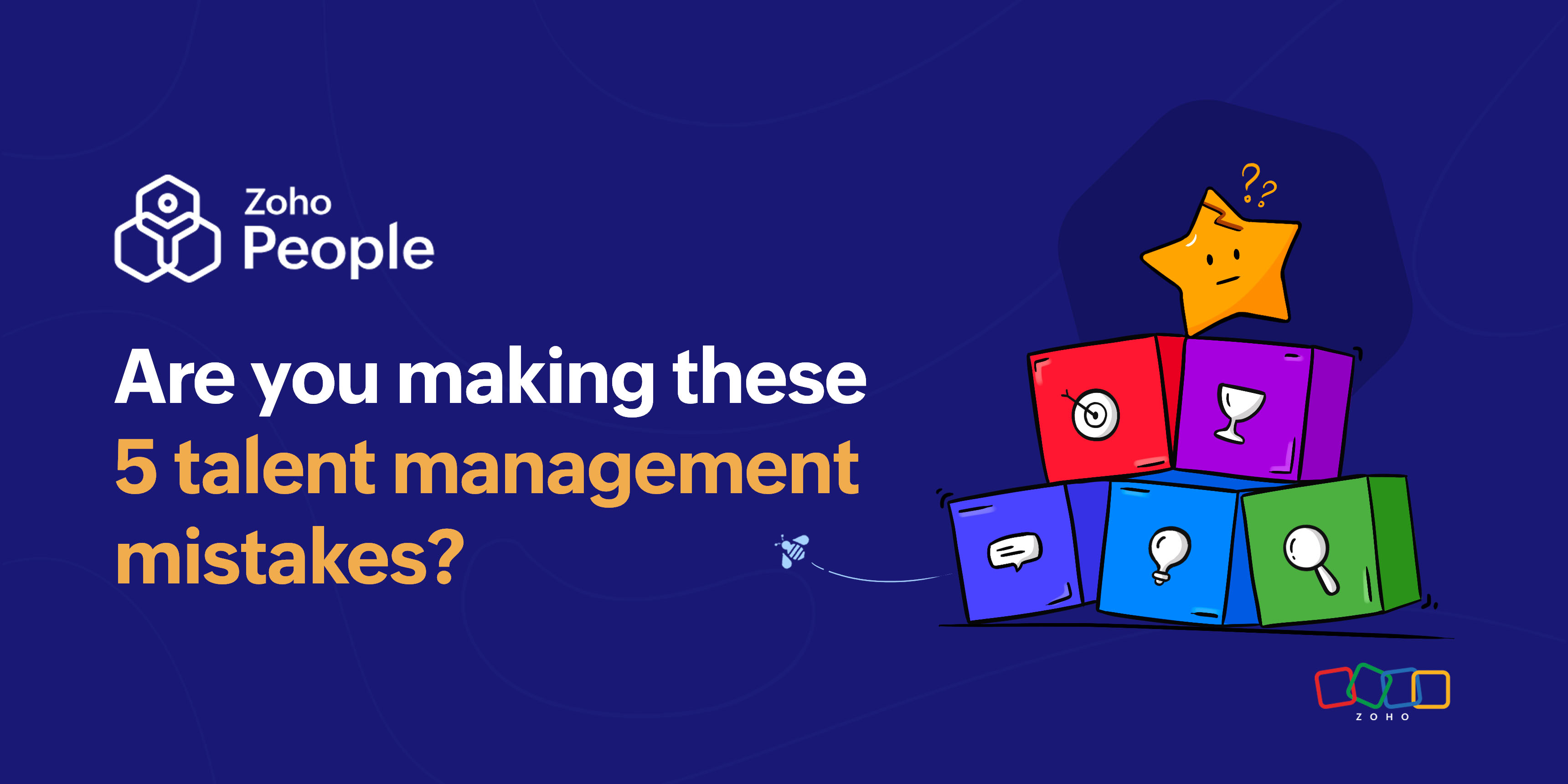- HOME
- HR insights
- 5 talent management mistakes every HR team should avoid
5 talent management mistakes every HR team should avoid
- Last Updated : January 2, 2024
- 873 Views
- 4 Min Read

About 78% of business executives rank talent management as one of their key priorities. Having a comprehensive talent management strategy in place is essential to attracting and retaining top talent, especially when the talent search is competitive. Amping up your talent management strategies will also help your organization build a high-performing workforce that drives innovation and turns any challenges into success stories. While building your talent management strategies, you must look out for mistakes that can jeopardize the time, effort, and money that you put behind them. Let's look at five mistakes that every HR team should avoid to keep their talent management strategies effective.
Mistake #1: Your recruitment process is not streamlined
Hiring is usually a candidate's first interaction with your organization. A lengthy recruitment processes that doesn't prioritize candidate experience can hamper your talent management strategies. You'll never be able to hire the right talent if you're struggling with inadequate job descriptions, poor communication, lack of recruitment automation, and poor onboarding.
Reevaluate your recruitment practices to ensure that there are no bottlenecks. Provide crystal clear job descriptions that highlight what you're looking for in your candidates, and mention the key responsibilities associated with the role. Offer a careers site that reflects your company culture and makes it easy for your candidates to apply. Level up your communication game and keep your candidates updated about every development.
Mistake #2: You aren't prioritizing employee feedback
Ignoring valuable feedback from your employees means that you'll never be able to understand what they expect from your organization or if they're really happy with your talent management strategies. When employees know that their feedback is being ignored, they may stop sharing it altogether. This can be dangerous, as they may become frustrated and disengage.
Appreciate and recognize the efforts of employees who share their feedback. Offer different avenues like polls, surveys, town halls, regular one-on-one meetings, and focus groups to make it easy for your employees to provide feedback. Pay close attention to their input, and implement suggestions into your operations. If certain proposals are not feasible, give employees clear explanations. Stay open-minded to negative feedback.
Also see: Tips to enhance the feedback system in your organization
Mistake #3: Letting micromanagement seep in
Managers who micromanage their teams can hurt your talent management strategies by building a culture of mistrust. Your employees may lose the zest to be creative or come up with new ideas, and as a result, they may not feel valued or motivated. They may even start doubting their ability to work independently and begin to feel powerless.
Firstly, make your managers aware of the ill effects of micromanaging employees. Encourage them to have open conversations with their team members about ask how they want to be managed, and how often they want to review their goal progress and exchange feedback. Before starting any projects, encourage managers to set clear expectations, assign goals, and delegate tasks. Ensure that employees have the right set of skills required for the project so that they don't need anyone constantly directing them.
Mistake #4: You don't have a retention strategy in place
Employees thinking about leaving your organization can be very damaging to your talent management strategies. If top talent starts leaving, your organizational productivity may take a hit and you'll find yourself spending time, effort, and money on hiring and training new talent. People continuously walking in and out of your organization could affect the morale of your existing employees too.
Take steps to identify why your employees are leaving in the first place by conducting exit surveys as part of your offboarding process. Understanding their reasons will help you build a more focused retention strategy. Revisit your compensation and benefits to ensure that they're competitive with industry standards. Be a little flexible if you're not already. Check out this infographic to understand how to reduce your organization's turnover rate.
Mistake #5: Rewards and recognition aren't a part of your strategy
Organizations that prioritize recognition see 14% higher employee engagement, productivity, and performance than organizations that don’t prioritize recognition. Without a proper rewards and recognition strategy, your employees may never know if they are going in the right direction, and this will decrease morale. This could also increase the turnover rate of your organization, as employees may not be very happy with their career progress.
Implement a holistic rewards and recognition strategy that is a combination of bonuses, incentives, meaningful rewards, and compensation hikes. You can also run a survey with your employees to understand and incorporate what they are expecting in terms of rewards and recognition. Create milestones that are eligible for the rewards so that managers can make decisions about who receives specific rewards. Check out how to develop a rewards and recognition strategy.
In general, build a culture of appreciation and recognition that allows managers to appreciate and show their gratitude towards their team members. Encourage employees to appreciate each other too.
Wrapping up
When you have the right set of strategies to manage your company's talent, you'll be able to attract and retain top talent, keep employees engaged, and build a fantastic company culture that puts employees first. We hope this blog post gave you a better idea about some common mistakes that have to be avoided when it comes to talent management.
Source:
1. AIHR
 Tarika
TarikaContent Specialist at Zoho People


